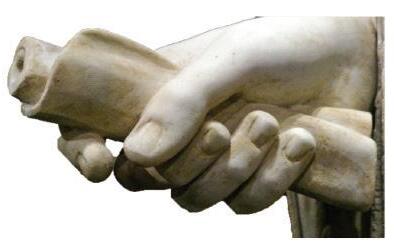
5 minute read
Reading into the past
The importance of humanity in today’s history education

Advertisement
Jakob Polly pollyjak000@hsestudents.org
In K-12 history classes across the country, incredible emphasis is placed on the nonspeci c. Day in and day out, students are met with PowerPoints titled, ‘ e Rise and Fall of Rome,’ ‘ e Causes of the American Revolutionary War’ or ‘ e Chinese Dynasties.’ In these lessons, history is o en treated as but a soulless, static vessel on which to mindlessly apply ‘historical skills.’ It is not uncommon to nd students in these history classes completely apathetic to the subject matter. And it is hard to blame them.
e study of history would cease to exist without the individual, and in the blind pursuit of only teaching students ‘historical skills,’ that very humanity is lost.
For thousands of years, history was something uniquely personal. Before the advent of written language, community history was passed down orally. From birth, one would hear of their community’s past triumphant victories and tragic woes. All knowledge of the world and one’s culture was understood by means of personal communication. is oral tradition, passed down over countless generations, allowed for an intimate and uniquely human connection to the world.
A legacy of this millenniaspanning oral tradition is found in ancient literature. Although far from impenetrable historical documents, stories like ‘the Odyssey,’ ‘the Epic of Gilgamesh,’ and ‘Beowulf’ shine a light onto a people o en assumed to be lesser. In reading the emotionally profound moments of Odysseus speaking to the spirit of his deceased mother, or Gilgamesh grappling with his own mortality a er the death of his friend, one sees just how emotionally complex people in the past truly were. is sentiment is felt strongly by classicist Emily Wilson, who in her 2017 translation of ‘the Odyssey’ writes, “Reading the Odyssey with fresh, curious, and critical eyes may help us not only rethink our assumptions about people in the past, but also break down some of our modern distinctions and assumptions.”

Of course, these protagonists are not real historical gures, nor do they face many of the same problems as you and I do today. Despite this, their value as tools for understanding and empathizing with those in the past is incredible. ese stories are products of real people and their lived experiences. While no one actually fought dragons or conversed with the gods, people did laugh, love, lie, cheat, grieve and su er, and that is demonstrated no more poetically than in ancient literature.
For years, ‘Beowulf,’ the longest surviving Old English poem, was o en dismissed by scholars due to its largely inaccurate depiction of sixthcentury Scandinavia. is all changed, however, when philologist and author J.R.R. Tolkien delivered a now-famous lecture at the British Academy in 1936, arguing that ‘Beowulf’ should be studied not as a historical document, but rather as a piece of historic poetry. In looking at ‘Beowulf’ in this way, one nds moving themes of mortality and the inevitability of death, as it was seen by people thousands of years ago. is unique perspective allows students to better connect and empathize with those in the past, something which is incredibly important when studying history. of argued

Although it may seem counterintuitive to introduce works of ction into an academic subject that relies heavily upon factual documentation, the value that ancient stories bring in fostering historical empathy is something that should not be overlooked. According to historian Craig Wollner, Leopold Von Ranke, a key gure in the development of historical empiricism and historiography, claimed, “a key attribute of the historical imagination is empathy.” To study, scrutinize, and understand history best, Ranke argued that one must rst understand the complex blend of emotion and ambition of each actor under study. Only in this understanding would one have the most objective analysis of history.
Naturally, the ‘historical skills’ and events taught in history class are important; they form the basis for understanding and analyzing the world as it is today. But, for too long has history been portrayed as the study of static, soulless characters, rather than what it really is: an intricate fabric weaved by the stories of individuals – individuals with just as much capacity for empathy and ambition as you and I today.
Memory is ckle, palpable, and can be twisted and bent like a dream, wavering and shi ing unconsciously. Memories, like dreams, can be haunting and short-lived but when something sticks, when memory breaks down the barriers of true and false, one must cling to the falsehoods that come in its wake.
False memories, memories tainted by suggestion or perception, are a phenomenon that no one can control. Everyone nds themselves falling victim to it, but for some, it becomes more sinister than inconvenient. For many, false memories are as simple as thinking you responded to a message but instead you only thought you did, while for others, it can be as complex as thinking you were the perpetrator of a crime when instead you only saw it on the news or misidentifying a criminal in a court case. In an experiment done by the Universities of Bedfordshire and British Colombia in 2015, it was proven that it was “surprisingly easy” to convince participants that they had taken part in a crime. By connecting the crime with an event experienced in their past, the researchers were able to fully convince participants of their involvement in the manufactured crime. Of the 30 participants who were made to believe that they committed a crime as a teenager, 21 were classi ed as having developed a false memory; of the 20 who were told about an assault of some kind, 11 reported elaborate falsely-remembered details of their ‘exact’ interaction with the police. e feelings involved with this memory were and are just as genuine as feeling as those that are truthful. ese individuals force themselves to reconstruct memories of the past to t this new narrative while their brains are constructing new ones to ll in the gaps to make them believe without reasonable doubt that what has happened to them is true. It is memories like this that beg the question of whether, these feelings while false, should be treated the same as those that are real. ere are many reasons false memories can occur, most commonly seen however is the combination of actual memories with suggestions given by others. is can be seen most e ectively in criminal cases. According to the Innocence Project, mistaken identity is the leading cause of wrongful conviction with almost 70% of more than 375 cases being overturned due to DNA testing in the U.S. ese cases are prime examples of how memories founded in truth can become reconstructed as a result of repetitively reliving a traumatic experience. When shown a lineup, victims o en expect that the criminal at fault will be there. is causes them to pick out the person who simply looks the closest. Soon the person can only see the misidenti ed gure when remembering the event. is coupled with reinforcement and feedback from law enforcement, creates a false sense of con dence in their incorrect choice. Here, their brain has rebuilt their memories to t what is convenient, at no fault of their own.









